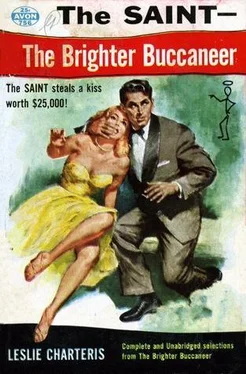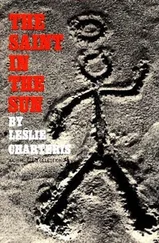Leslie Charteris - The Brighter Buccaneer
Здесь есть возможность читать онлайн «Leslie Charteris - The Brighter Buccaneer» весь текст электронной книги совершенно бесплатно (целиком полную версию без сокращений). В некоторых случаях можно слушать аудио, скачать через торрент в формате fb2 и присутствует краткое содержание. Год выпуска: 1933, Издательство: Doubleday, Жанр: Детектив, на английском языке. Описание произведения, (предисловие) а так же отзывы посетителей доступны на портале библиотеки ЛибКат.
- Название:The Brighter Buccaneer
- Автор:
- Издательство:Doubleday
- Жанр:
- Год:1933
- ISBN:нет данных
- Рейтинг книги:5 / 5. Голосов: 1
-
Избранное:Добавить в избранное
- Отзывы:
-
Ваша оценка:
- 100
- 1
- 2
- 3
- 4
- 5
The Brighter Buccaneer: краткое содержание, описание и аннотация
Предлагаем к чтению аннотацию, описание, краткое содержание или предисловие (зависит от того, что написал сам автор книги «The Brighter Buccaneer»). Если вы не нашли необходимую информацию о книге — напишите в комментариях, мы постараемся отыскать её.
The Brighter Buccaneer — читать онлайн бесплатно полную книгу (весь текст) целиком
Ниже представлен текст книги, разбитый по страницам. Система сохранения места последней прочитанной страницы, позволяет с удобством читать онлайн бесплатно книгу «The Brighter Buccaneer», без необходимости каждый раз заново искать на чём Вы остановились. Поставьте закладку, и сможете в любой момент перейти на страницу, на которой закончили чтение.
Интервал:
Закладка:
Old Charlie Milton, who had been dragged away from his breakfast to sell him the facsimile for eighty pounds, felt much the same.
3. The Unblemished Bootlegger
Mr. Melford Croon considered himself a very prosperous man. The brass plate outside his unassuming suite of offices in Gray's Inn Road described him somewhat vaguely as a "Financial Consultant"; and while it is true that the gilt-edged moguls of the city had never been known to seek his advice, there is no doubt that he flourished exceedingly.
Out of Mr. Croon's fertile financial genius emerged, for example. the great Tin Salvage Trust. In circulars, advertisements, and statements to the Press, Mr. Croon raised his literary hands in horror at the appalling waste of tin that was going on day by day throughout the country. "Tins," of course as understood in the British domestic vocabulary to mean the sepulchres of Hcinz's 57 Varieties, the Crosse & Blackwell vegetable garden, or the Campbell soup kitchen, are made of thin sheet steel with the most economical possible plating of genuine tin; but nevertheless (Mr. Croon pointed out) tin was used. And what happened to it? It was thrown away.
The garbage man removed it along with the other contents of the ashcan, and the municiapl incenerators burnt it. And tin was a precious metal — not quite so valuable as gold and platinum, but not very far behind silver. Mr. Croon invited his readers to think of it. Hundreds of thousands of pounds being poured into garbage dumps and incinerators every day of the week from every kitchen in the land. Individually worthless "tins" which in the accumulation represented an enormous potential wealth.
The great Tin Salvage Trust was formed with a capital of nearly a quarter of a million to deal with the problem. Barrows would collect cans from door to door. Rag-and-bone men would lend their services. A vast refining and smelting plant would be built to recover the pure tin. Enormous dividends would be paid. The subscribers would grow rich overnight
The subscribers did not grow rich overnight; but that was not Mr. Croon's fault. The Official Receiver reluctantly had to admit it, when the Trust went into liquidation eighteen months after it was formed. The regrettable capriciousness of fortune discovered and enlarged a fatal leak in the scheme; without quite knowing how it all happened, a couple of dazed promoters found themselves listening to sentences of penal servitude; and the creditors were glad to accept one shilling in the pound. Mr. Croon was overcome with grief — he said so in public — but he could not possibly be blamed for the failure. He had no connection whatever with the Trust, except as Financial Consultant — a post for which he received a merely nominal salary. It was all very sad.
In similar circumstances, Mr. Croon was overcome with grief at the failures of the great Rubber Waste Products Corporation, the Iron Workers' Benevolent Guild, the Small Investors' Cooperative Bank, and the Consolidated Albion Film Company. He had a hard and unprofitable life; and if his mansion flat in Hampstead, his Rolls Royce, his shoot in Scotland, his racing stable, and his house at Marlow helped to console him, it is quite certain that he needed them.
"A very suitable specimen for us to study," said Simon Templar.
The latest product of Mr. Croon's indomitable inventiveness was spread out on his knee. It took the form of a very artistically typewritten letter, which had been passed on to the Saint by a chance acquaintance.
Dear Sir,
As you cannot fail to be aware, a state of Prohibition exists at present in the United States of America. This has led to a highly profitable trade in the forbidden alcoholic drinks between countries not so affected and the United States.
A considerable difference of opinion exists as to whether this traffic is morally justified. There can be no question, however, that from the standpoint of this country it cannot be legally attacked, nor that the profits, in proportion to the risk, are exceptionally attractive.
If you should desire further information on the subject I shall be pleased to supply it at the above address.
Yours faithfully,
Melford Croon.Simon Templar called on Mr. Croon one morning by appointment; and the name he gave was not his own. He found Mr. Croon to be a portly and rather pale-faced man, with the flowing iron-grey mane of an impresario; and the information he gave — after a few particularly shrewd inquiries about his visitor's status and occupation — was very much what the Saint had expected.
"A friend of mine," said Mr. Croon — he never claimed personally to be the author of the schemes on which he gave Financial Consultations — "a friend of mine is interested in sending a cargo of wines and spirits to America. Naturally, the expenses are somewhat heavy. He has to charter a ship, engage a crew, purchase the cargo, and arrange to dispose of it on the other side. While he would prefer to find the whole of the money — and, of course, reap all the reward-he is unfortunately left short of about two thousand pounds."
"I see," said the Saint.
He saw much more than Mr. Croon told him, but he did not say so.
"This two thousand pounds," said Mr. Croon, "represents about one-fifth of the cost of the trip, and in order to complete his arrangements my friend is prepared to offer a quarter of his profits to anyone who will go into partnership with him. As he expects to make at least ten thousand pounds, you will see that there are not many speculations which offer such a liberal return."
If there was one role which Simon Templar could play better than any other, it was that of the kind of man whom financial consultants of every size and species dream that they may meet one day before they die. Mr. Croon's heart warmed towards him as Simon laid on the touches of his self-created character with a master's brush.
"A very charming man," thought the Saint as he paused on the pavement outside the building which housed Mr. Croon's offices.
Since at various stages of the interview Mr. Croon's effusive bonhomie had fairly bubbled with invitations to lunch with Mr. Croon, dine with Mr. Croon, shoot with Mr. Croon, watch Mr. Croon's horses win at Goodwood with Mr. Croon, and spend week-ends with Mr. Croon at Mr. Croon's house on the river, the character which Simon Templar had been playing might have thought that the line of the Saint's lips were unduly cynical; but Simon was only thinking of his own mission in life.
He stood there with his walking cane swinging gently in his fingers, gazing at the very commonplace street scene with thoughtful blue eyes, and became aware that a young man with the physique of a pugilist was standing at his shoulder. Simon waited.
"Have you been to see Croon?" demanded the young man suddenly.
Simon looked around with a slight smile.
"Why ask?" he murmured. "You were outside Croon's room when I came out, and you followed me down the stairs."
"I just wondered."
The young man had a pleasantly ugly face with crinkly grey eyes that would have liked to be friendly; but he was very plainly nervous.
"Are you interested in bootlegging?" asked the Saint; and the young man stared at him grimly.
"Listen, I don't know if you're trying to be funny, but I'm not. I'm probably going to be arrested this afternoon. In the last month I've lost about five thousand pounds in Croon's schemes — and the money wasn't mine to lose. You can think what you like. I went up there to bash his face in before they get me, and I'm going back now for the same reason. But I saw you come out, and you didn't look like a crook. I thought I'd give you a word of warning. You can take it or leave it. Goodbye."
He turned off abruptly into the building, but Simon reached out and caught him by the elbow.
Читать дальшеИнтервал:
Закладка:
Похожие книги на «The Brighter Buccaneer»
Представляем Вашему вниманию похожие книги на «The Brighter Buccaneer» списком для выбора. Мы отобрали схожую по названию и смыслу литературу в надежде предоставить читателям больше вариантов отыскать новые, интересные, ещё непрочитанные произведения.
Обсуждение, отзывы о книге «The Brighter Buccaneer» и просто собственные мнения читателей. Оставьте ваши комментарии, напишите, что Вы думаете о произведении, его смысле или главных героях. Укажите что конкретно понравилось, а что нет, и почему Вы так считаете.












